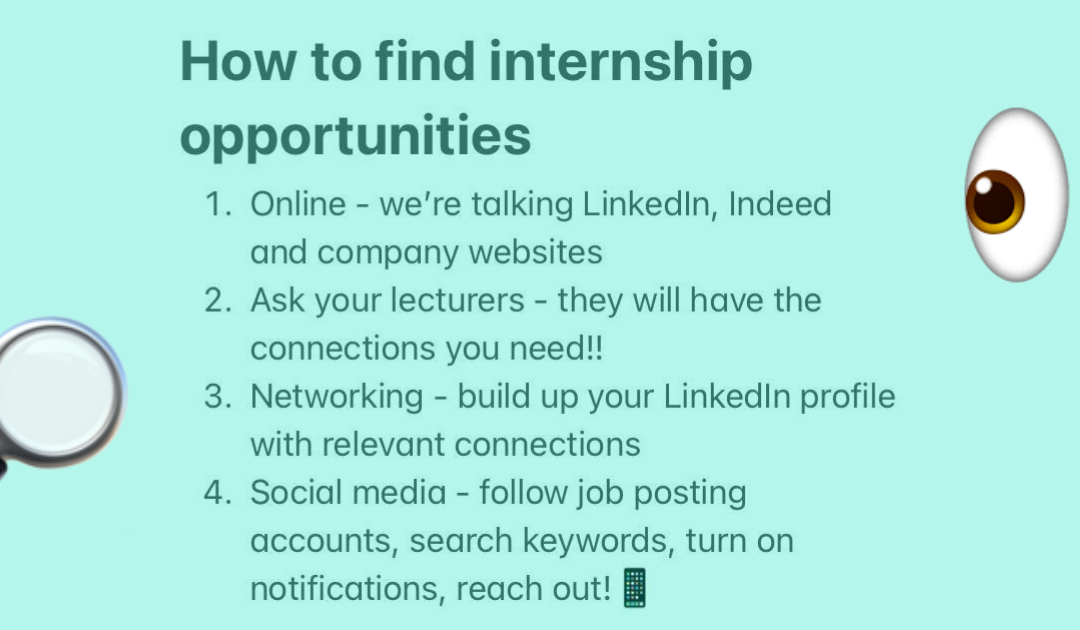So, you’ve decided that an internship is your next step to kickstart your career… but where do you even begin? Whether you’re a student eager to gain hands-on experience or a grad ready for the professional world, the first step is knowing where to look. Keep reading for 8 ways to find an internship as a student or grad.
Before we get started, make sure you’re signed up to receive our internship email alerts to be in with the chance of nabbing a paid, flexible and remote internship! Done? Perfect, now let’s get stuck in.
Find Internships Online
To find a good internship, you need to use every tool at your disposal.
First start with one of the most common places you might go to look for an internship, a job board like Indeed on LinkedIn. A lot of these sites allow you to filter results based on the kind of opportunity you’re looking for, location and salary so take a look and see what kind of opportunities are available.
Another place to find internships is by searching through company websites. Start by making a list of companies you’d love to work for and visit their careers or internship section on their websites. Many companies will post internship openings here as well as their LinkedIn page.
Speaking of LinkedIn… we post our latest opportunities over on our LinkedIn so if you’re not already, go have a little stalk, drop us a follow and make sure you have your alerts turned on ready for our next internship post. You can also sign up to our internship waitlist and let us know what kind of role you’re looking for!
Ask Your Lecturers For Internships
A lecturer or tutor is usually an expert in their field, and if you’re looking for an internship or job, they likely have connections to other professionals in the industry. Ask your professors if they know of any opportunities that might fit your needs. If you want to work with a particular company, it never hurts to ask! You never know, they might even suggest you do an internship with them, helping them out as an assistant.
Lecturers are also good sources of information when it comes to job interviews and applications. They can provide advice on the questions that might be asked during an interview and the best ways to prepare. If you have a problem with writing cover letters or CVs, ask your professor for help—there are no dumb questions and they might even have a great example to share with you! You can also check out our blogs on how to write the perfect CV.
Use LinkedIn to Find an Internship
If you haven’t already, create a LinkedIn profile that highlights your strengths and connect with people who work in your industry of interest (if you need help optimising your LinkedIn profile, book a virtual review with one of our expert team). Not only is this a great way to find an internship but an optimised profile can attract hiring managers and recruiters who will slide in your DMs with grad jobs they think you’d be suitable for!
When you’re trying to find an internship or looking for recommendations, reach out via LinkedIn messages first even if the initial opportunity isn’t advertised on this platform. This can be an easier way of getting noticed and having your application stand out. It also gives you the opportunity to ask questions about the internship and shows that you’re serious about the role. If you’re not quite sure how to network, you’re in luck because you can download our free networking resource with a bunch of connection request templates to use.
Utilise Networking Events
As a student or grad, you’ll likely be invited to networking events. Go to these industry networking events and talk to as many people as possible to find your next internship.
When you’re at these events, ask professionals about themselves and their jobs. Networking is an important part of the job search process. It’s not just about meeting people who can help you find a job—it also allows you to get practice talking about yourself, your skills and what you want from your career. You never know who you will come across and how one conversation can lead to a ton of opportunities.
Ask people in the industry if they know of any open internships at their company or elsewhere in the field. Even if someone doesn’t know of any openings, ask if they would be happy to keep you in mind for future opportunities and steer the conversation to ask more about how they landed their current role (or anything else you’d like to know about them). They’ll appreciate that you took the time to learn about them and this will help you to build a genuine connection. Finding an internship can be as easy as having a chat like this.
Leverage Social Media To Find An Internship
Did you know you can make the most of social media sites to find an internship? Social media sites like LinkedIn, Facebook, Twitter and Instagram have a ton of advertised (and hidden) internship opportunities but you need to know how to tap into them.
We’ve already talked about using LinkedIn but did you know that Facebook is another useful place to find an internship if you search through job-specific groups? Many groups have been created for students and grads looking for entry-level jobs and internship opportunities. Join a bunch and introduce yourself with a post. Let the group know what kind of role you want and hopefully, you’ll connect with potential employers.
Other sites like Twitter (sorry, we obvs mean X) and Instagram can help you find an internship by using the search bar or tapping into hashtags. There will always be threads advertising roles and Instagram stories shouting about job opportunities.
Check With Your Friends
This might seem obvious but make sure your friends know you’re searching for an internship. And ask your friends to ask their friends!
Your friends or coursemates may have just landed their first internship, seen something interesting online or have heard about a new opportunity from their lectures. Their parents may even be looking for interns at their company or their family may have connections that can help you find something. You’ll never know if you don’t ask!
Make The Most Of Careers Advisors
Are you taking advantage of the resources your uni is providing for you? Your career advisors are there for this exact reason – to help you find an internship or grad job – so make sure you’re visiting them.
Most schools have a career department that can help you find an internship, navigate the application process, choose the right internships for your needs, and prepare for interviews. These departments also often have a list of local companies that are looking for interns and connections within these companies that give you an upper hand.
Seek Out Volunteer Opportunities
Did you know a volunteer role can lead to an internship or even a grad job?
Volunteering is a great way to learn more about your chosen field, build skills and make quality connections. Not to mention, it’s the perfect way to get your foot in the door of a dream company – volunteering your time shows real passion and initiative which is something that basically every company wants to see in a new hire. Put this experience to use in your future internship applications to land that dream opportunity.
The internship search can seem competitive, and it’s important to remember that rejection is part of the process. Keep applying, refining your approach, and learning from each experience. If you’d like to talk to one of The Grad Soc team, grab your custard creams and book a free, 15-minute call to discuss any questions you might have. Remember, keep an open mind – if one way doesn’t work out, try another!

